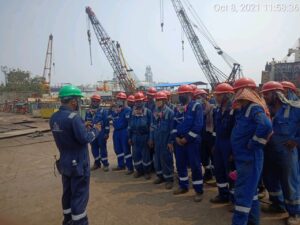- Leading ship recycling company and has been established in 1983
Responsible Ship Recycling Standards
Ship dismantling or ship recycling involves material recovery and waste management of many hazardous materials. To ensure safe, environment-friendly recycling of ships, Responsible Ship Recycling Standards (RSRS) were introduced by the Hong Kong International Convention. The main purpose of the Responsible Ship Recycling Standards is to address the concerns related to human health and the environment posed by unregulated ship recycling practices.
In this blog compiled by R.L. Kalthia Shipping Company, you will learn about the role of Responsible Ship Recycling Standards in promoting sustainable practices in the shipbreaking industry. These ship recycling standards are also responsible for setting the criteria for ship recycling facilities and giving guidelines on the necessary infrastructure, equipment, and trained personnel to carry out recycling operations safely. To know more about the Responsible Ship Recycling Standards go through the blog below.

A Closer Look at the Responsible Ship Recycling Standards (RSRS)
Responsible Ship Recycling Standards (RSRS) were laid down in the year 2017 under the Hong Kong International Convention for the Safe and Environmentally Sound Recycling of Ships. It currently consists of 12 members including major European ship financiers. The RSRS comprises voluntary guidelines, especially for the financial institutions active in the ship recycling industry.
The requirements mentioned in the RSRS are framed around Hong Kong
Convention. All the regulations and standards are applicable to labor & human rights, anti-corruption, and review activities regarding downstream waste
management activities. Go through the key features of RSRS mentioned below to know more about the role of these standards in promoting the safe and sound recycling of ships.
- Recommend highly beneficial guidelines for the proper handling, disposal, and removal of hazardous material recovered from the ships.
- Ensure the safety and welfare of the workers by addressing safety concerns and the necessity of personal protective equipment.
- Helps in documenting the entire ship recycling process and promotes transparency.
- Adhere to international agreements such as the Hong Kong International Convention for the Safe and Environmentally Sound Recycling of Ships.
Role of Banks in Implementing Responsible Ship Recycling Standards
Banks are a prominent source of funding for ship owners and operators willing to build purchase, or repair vessels. Their involvement in the shipbreaking industry can be justified by the fact that finance is a crucial aspect of any industry and can easily promote shipbreaking practices. The banks integrate the Responsible Ship Recycling Standards (RSRS) in their Environment, Social, and Governance (ESG) policies and aim to improve ship recycling practices.
The role of banks in promoting the guidelines by RSRS are mentioned below:
- Not getting involved in the financing of unsustainable recycling facilities.
- Integrate RSRS into their ESG policies and lending practices to promote environment-friendly shipbreaking practices.
- Encourage discussion with the clients around the policies and practices related to ship dismantling.
- Promote RSRS and the importance of sustainable ship recycling and offshore industries.
- Encourage other banks to adopt Responsible Ship Recycling Standards.
- Offer financial incentives and rewards to the ship owners who adhere to the RSRS guidelines.
- Establish mechanisms for ongoing monitoring and reporting of ship recycling practices of their clients.
Striking a Balance Between Environmental and Economic Considerations
Since, the launch of Responsible Ship Recycling Standards in 2017 many new guidelines or standards have been introduced. The new standards were adopted and got finally approved in 2021. One of the main changes was brought in the expansion of the scope of the RSRS with mobile offshore units, such as oil and gas platforms. However, to successfully implement the Responsible Ship Recycling Standards at a global scale it is important to maintain a balance between environmental and economic considerations.
This balance can be brought about through thoughtful planning, collaboration, and innovative solutions. The strategies to focus on environmental and economic aspects of Responsible Ship Recycling Standards (RSRS) are mentioned below:
Incentives on Sustainable Practices: One of the best ways to promote sustainable ship recycling practices is through incentivizing such practices by Government and international bodies.
Green Innovation: Encouraging innovation in shipbreaking technologies can lead to the creation of more efficient and less polluting ship dismantling methods.
Capacity Building: With proper training for the workers and safe dismantling practices the safety and well-being of the workers can be ensured. This can also enhance the efficiency of the ship recycling process.
Collaboration and Dialogue: By encouraging the dialogue among governments, industry players, environmental organizations, and local communities more efficient ways of implementing the Responsible Ship Recycling Standards can be encouraged.
Conclusion
In the coming years, the members of Responsible Ship Recycling Standards aim to promote these guidelines and commitments. This can be brought about by engaging with clients and the broader financial sector on the new standards. Another goal is to recruit banks from a wide array of geographies in order to make an impact on a global scale. One should also know that Responsible Ship Recycling Standards may vary from one region to another and are subject to updates and revisions as the industry evolves.